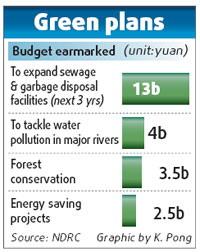The nation's stimulus package has benefited energy conservation and emission controls with energy used to generate growth dropping further in the first quarter, the National Bureau of Statistics (NBS) has said.
Energy intensity, or the amount of energy needed to generate per unit of GDP, dropped 2.89 percent year on year from January to March. That compares with a drop of 2.62 percent in the first quarter of 2008.

Overall energy consumption grew only 3.04 percent in the first quarter from a year earlier while the economy expanded 6.1 percent, the bureau said in a statement.
The NBS said the ratio of the services sector in the overall economy rose 1.6 percentage points, while the industrial sector dropped 1.9 percentage points. Also, the output of six energy-intensive industries fell 12.5 percent from the previous year.
The figures show the stimulus measures have aided efforts to increase energy efficiency, cut emissions and promote economic restructuring, it said.
The government announced a $586 billion stimulus package last November to prop up domestic demand and maintain growth. But the huge spending plan sparked concerns that officials might compromise on environmental protection and energy saving targets, given the emphasis on growth.
Yet, analysts said little of the government's spending has been allocated to high energy-consuming or highly-polluting projects, while spending on environmental issues has been increased.
Capital requirements for projects such as railways, airports and housing will be lowered to raise investment, said a State Council meeting presided by Premier Wen Jiabao yesterday.
However, capital requirement for investments in high energy-consuming or heavily-polluting sectors, such as aluminum smelting, will be raised to prevent a rebound of production capacity in such industries.
Of the 230 billion yuan the central government has approved on stimulus spending over the past two quarters, 10 percent went toward energy conservation, emission control and environmental protection projects, the National Development and Reform Commission said in a statement yesterday.
The figures show the central government wants to strike a balance between growth and economic restructuring, said Chi Fuling, president of the China (Hainan) Reform and Development Research Institute.
The government may even increase spending on energy saving and environment protection as it tries to facilitate industrial transformation, Chi said.
According to the NDRC, the government has earmarked 13 billion yuan in the next three years to expand sewage and garbage disposal facilities to most townships. It has also allocated 4 billion yuan for tackling water pollution in major rivers such as the Huaihe and the Songhuajiang. Forest conservation and energy saving projects get a combined 6 billion yuan.
The government has pledged to reduce energy intensity by 20 percent by 2020 from 2005 levels; and chemical oxygen demand (COD), a key index of water pollution, and emissions of sulfur dioxide (SO2), a main air pollutant, by 10 percent between 2006 to 2010.
Source:China Daily
Related News
Photos
More>>trade
- Chinese state adviser held a symposium of Chinese enterprises in Saudi Arabia
- Georgian Prime Minister meets Vice Premier of the People's Republic of China
- The work team of Bureau of Industry Injury Investigation of Ministry of China
- Saudi International Heart&Health Care Exhibition
- The delegation of Sino-Arab Friendship Association visited Saudi Arabia
market
finance
- 14th Pak-China Joint Economic Commission (JEC) meeting concluded in Islamabad
- Chinese Commodity Exhibition 2010 in Saudi Arabia will open soon
- China Harbor Engineering Company won Ras Al-Zour port two wharfs construction
- Saudi Ports signs SR435.96m deals
- Saudi commercial minister visited China successfully





